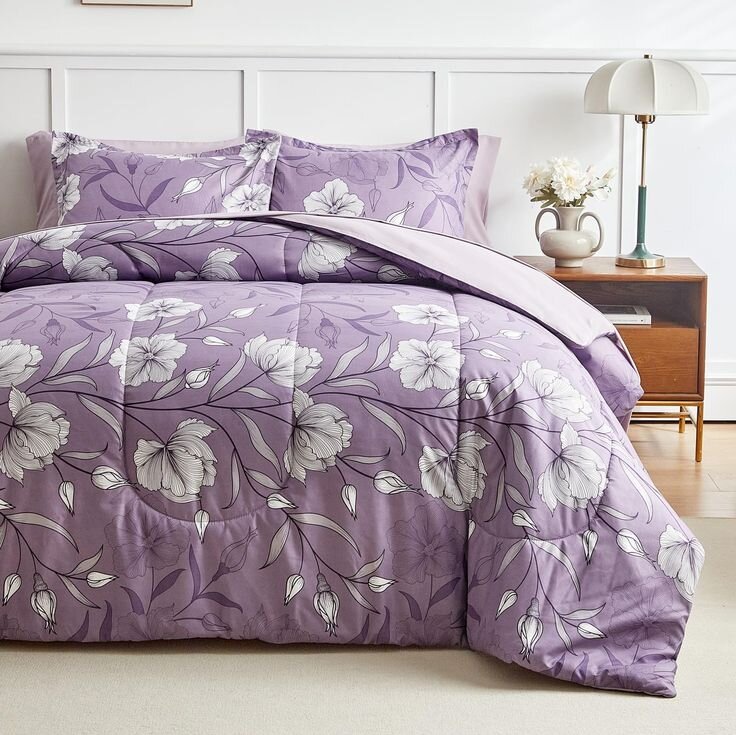What distinguishes a comforter from a duvet? Although “comforter” and “duvet” are sometimes used interchangeably, they have different structures, differ in plushness, and need different maintenance. Comforters are a single piece of quilted bedding, whereas duvets are made up of an insert and a cover.
There are many questions that arise in our minds which one is better? Duvet or Comforter? Which is more reliable and warmer in winter,In the end of this blog you will surely get to know which one you should choose for your bed.

What Duvet is?
| Feature | Description |
|---|---|
| Origin | Derived from the French word for down (fine feathers from geese and ducks) |
| Filling | Traditionally down or feathers; now includes cotton, silk, wool, and synthetic fabrics |
| Shell | Usually cotton or polyester |
| Cover | Removable for easy cleaning and style options |
| Closure | Ties, zips, or buttons |
| Care | A common issue that can be remedied with tumble drying |
| Clumping | Common issue that can be remedied with tumble drying |
| Purpose | Soft, puffy bed cover for insulation and comfort |

What is Comforter?
| Feature | Comforter |
|---|---|
| Usage | Stand-alone, no cover needed |
| Filling | Typically down, feathers, or synthetic fiber |
| Quilt Pattern | Quilted stitching to prevent clumping |
| Size | Oversized to hang over the edge of the mattress |
| Warmth | Generally less warm than a duvet |
| Care | Machine washable (varies based on fill material) |
| Bedding Set | Often comes as part of a complete bedding set |
| Protection | Use a top sheet for added protection |
| Aesthetics | Wide range of colors, patterns, and textures |
Duvet vs. Comforter
When deciding between a duvet and a comforter for your bed, it’s important to weigh the pros and cons of each option. Here’s a breakdown of the key factors to consider:
Comfort
- Duvets offer a plush, snuggly feel due to their fiber-filled nature, creating a cozy and inviting atmosphere. However, they can be prone to “duvet drift,” where the filling clumps together, potentially disrupting your sleep.
- Comforters provide a flatter, more even surface and work well for layering with other bedding, such as weighted blankets.
Price
- Comforters are generally more affordable than high-quality duvets, but you may need additional blankets for colder weather. Additionally, if your comforter becomes damaged or stained, you can’t simply replace the cover.
- Duvets tend to be more expensive, especially if you choose a down or feather filling. The higher the insulation quality, the more costly the duvet will be.
Design
- Duvet covers offer a budget-friendly way to change the look of your bedroom. Simply swapping out the cover can create a fresh new feel.
- Comforters are typically part of bedding sets, limiting your design options.
Cleaning
- Duvet covers are easier to wash than heavy comforters. However, duvets themselves can be more difficult to clean, depending on the thickness and filling material.
- Comforters may need professional cleaning. Larger washers can handle king-size comforters, but smaller ones may require a trip to the laundromat.
Convenience
- Comforters are easier to use and don’t require wrestling with a cover.
- Duvets can be more hassle to change, especially if you struggle with getting the cover on.
Which one is warmer a Duvet or Comforter?
- Comforters are lightweight and suitable for warm weather, but you may need additional blankets in colder temperatures.
- Duvets offer a wider range of insulation options, allowing you to choose a suitable warmth level for different seasons.
Sleeping Habits
- Comforters can be a good choice if you and your partner tend to steal the covers.
- Duvets are ideal for those who prefer a snug and cozy feeling.
Size
- Duvets and duvet covers may be smaller than comforters designed for the same bed size.
- Consider going up a size for both duvets and comforters to ensure adequate overhang.
Some Important things to know
How often should I wash my comforter?
Generally, you should wash your comforter every 2-3 months. This helps to keep it clean, fresh, and free of allergens.
However, the exact frequency may vary depending on several factors:
- How often you use it: If you use your comforter frequently, you’ll need to wash it more often.
- The type of filling: Down comforters may need to be washed less frequently than synthetic comforters.
- Any stains or spills: If your comforter gets stained or spilled on, you should wash it immediately.
It’s important to follow the care instructions on the comforter’s label to ensure you’re washing it correctly.
Can you wash comforter in washer?
Yes, you can usually put a comforter in the washer. However, there are a few things to keep in mind:
- Check the care label: Always consult the care label on your comforter for specific washing instructions. Some comforters may have special care requirements.
- Consider the size of your washer: Ensure your washer is large enough to accommodate the comforter. Overloading the washer can damage both the comforter and the machine.
- Use a gentle detergent: Opt for a mild detergent that is safe for delicate fabrics. Avoid using bleach or fabric softeners, as these can damage the comforter’s fibers.
- Wash on a delicate cycle: Use a gentle cycle with warm water to clean the comforter without damaging it.
- Dry thoroughly: It’s important to dry the comforter completely after washing. A damp comforter can develop mildew or mold. If possible, tumble dry on a low heat setting.
If you’re unsure about washing your comforter at home, you can always take it to a professional cleaner.
What do hotels use comforter or duvet?
Hotels typically use comforters rather than duvets.
Here’s why:
- Durability: Comforters are generally more durable than duvets, making them better suited for high-turnover environments like hotels.
- Loft and warmth: Comforters often provide a more substantial loft and warmth, which is desirable for guests seeking a cozy night’s sleep.
- Ease of cleaning: Comforters are typically easier to clean and maintain, especially for hotels with large laundry facilities.
While some hotels may use duvets, especially high-end establishments, comforters are the more common choice due to their practicality and durability.
Are quilts more expensive than comforters?
Yes, some comforters, especially those made with high-quality materials or unique features, can also be quite expensive. Ultimately, the price of a quilt or comforter will depend on your specific needs and preferences.
Is it ok not to use duvet cover?
Yes it’s totally ok not to use duvet cover if it’s not perfectly attached to your duvet or its dirty. Without duvet cover, you can enjoy the natural material of duvet.But there are some things to consider to using duvet without cover like hygiene, versatility or durability.
Is duvet insert just a comforter?
Both terms refer to the fluffy, insulating layer that goes inside a duvet cover. The main difference is in the terminology: “duvet insert” is a more common term used in the United States, while “comforter” is often used in other parts of the world.
what do America use instead of duvets?
In the United States, the most common alternative to duvets is comforters. Comforters are typically thicker and heavier than quilts, and they’re often filled with materials like down, feathers, or synthetic fibers. They’re designed to be used on their own, without a separate cover.
While some Americans may use duvets, especially in regions with colder climates, comforters are the more popular choice for most people.
Which duvet cover material is best?
The best duvet cover material depends on your personal preferences and needs. Here are some popular options:
- Cotton: Soft, breathable, and hypoallergenic, cotton is a classic choice for duvet covers. It comes in various weights and textures, from lightweight percale to heavier flannel.
- Linen: Linen is another natural fiber known for its breathability and durability. It has a slightly rough texture that can become softer over time.
- Tencel: Made from eucalyptus pulp, Tencel is a moisture-wicking and temperature-regulating fabric. It’s soft, smooth, and hypoallergenic.
- Microfiber: This synthetic fabric is known for its softness and durability. It’s also wrinkle-resistant and easy to care for.
- Silk: Luxurious and silky smooth, silk is a great option for those seeking a premium duvet cover. However, it can be more expensive and requires special care.
When choosing a duvet cover material, consider the following factors:
- Breathability: Look for materials that allow air to circulate, keeping you cool in the summer and warm in the winter.
- Softness: Choose a material that feels comfortable against your skin.
- Durability: Opt for a material that can withstand frequent washing and drying.
- Allergy considerations: If you have allergies, consider hypoallergenic materials like cotton, linen, or Tencel.
- Care requirements: Some materials may require special care, such as dry cleaning or hand washing.
Which duvet is best for winter?
For a winter duvet, you’ll want to choose one with a high insulation value. This means it should be thick and filled with a warm material. Here are some popular options:
- Down duvets: Down is considered one of the warmest and most comfortable materials for duvets. It’s lightweight, fluffy, and has excellent insulation properties. The higher the fill power (measured in cubic inches per ounce), the warmer the duvet will be.
- Feather duvets: Feathers are a slightly less expensive alternative to down, but they still provide good insulation. However, they may not be as soft or as fluffy as down.
- Synthetic duvets: Synthetic materials like polyester or microfiber can also be warm and comfortable. They’re often hypoallergenic and easier to care for than down or feather duvets.
When choosing a winter duvet, consider the following factors:
- Climate: If you live in an extremely cold climate, you may need a duvet with a very high insulation value.
- Personal preference: Some people prefer the softness and warmth of down, while others find synthetic materials more comfortable.
- Budget: Down duvets can be more expensive than synthetic duvets.
- Care requirements: Down and feather duvets may require special care, such as professional cleaning.
Here’s a general guide to duvet warmth:
- Lightweight: Suitable for warm weather or as a top layer in mild climates.
- Medium-weight: Ideal for most climates, providing good warmth without being too heavy.
- Heavyweight: Best for extremely cold climates or people who prefer a very warm duvet.







